IHRC organised a Poetry Night for Palestine, with Politics and History student (SOAS University) and poetry performer, Anika Wadood, on Friday, 19 January 2024.
Watch here:
The evening commenced with an introduction by Anika Wadood, highlighting all the proceeds from the poetry night is put towards IHRC’s Palestine Appeal. Anika mentioned the event is a reminder that situation in Palestine began in 1948, not October 7; she mentioned the current raids and death toll in Gaza and the West Bank and asked the audience to remember our brothers and sisters until there is a free Palestine. Anika stated poetry and any form of art, such as the likes of Mahmoud Darwish, is utilised to raise awareness on the ongoing injustices, and the poetry night “is about using art with our talented performers to share a few words about Palestine”.
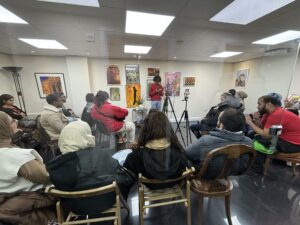
Anika read a poem from a book, Poems for Palestine, a collection by Palestinian authors. She read a poem called ‘1948’ by J. M. Zachariya, and her own writing called ‘The Water Drips From My Leaky Ceiling’. On the 1971 Liberation war in Bangladesh, Anika recited a poem she wrote called ‘Bangladesh Were Silent’.
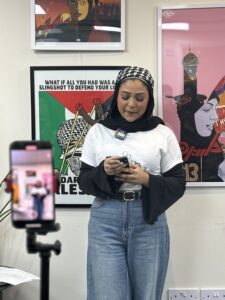
Anika was followed by Hussein Sheekh, a 17-year-old writer from East London; Hussein performed four poems. Hiss first poem was his initial reaction to the event that followed October 7th, called ‘Everything I Wish For the Dead and the Dying’. His second poem was about the children killed by the IOF, followed by ‘Will They Forgive?’, which is about the different types of people affected by the bombings. Another poem was inspired by what Palestine will be like once it and the people are free, called ‘Beyond My Cries in Sujood’. Hussein’s final poem focused on the journey of all immigrants coming towards Europe and how they are essentially not seen as human, titled ‘Leaving 1991’.
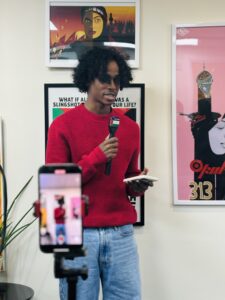
Zaynab Mufti, poetry performer and writer, shared three poems on Palestine, beginning with: ‘The Land of Palestine’. Zaynab said:
“Being a Muslim, as we struggle to witness, hear about, talk about, think about Palestine at the moment and the sheer inhumane treatment of the people of Palestine, for most people I know, it is their faith and moral and values that keep them going and allows them to draw strength and to be hopeful. We are also inspired by and draw strength from the people of Palestinians themselves and so, hopefully when you listen to these poems, whether or not you are Muslim, you can draw strength from our traditions, the concepts and values we have. One of those [concepts] being that Allah, God, is the Most Just. No matter what happens or what times we are in, justice will prevail. One of the mechanisms by which justice will prevail is that everything has a spirit, and everything sees and witnesses… inanimate objects see and witness, and on the Day of Judgement, inanimate onjects will testify and speak for or against human beings, from the rocks and leaves, the sky, the walls and the land”.
Zaynab’s second poem was called ‘The Daughters of Palestine’, and her final poem, ‘Glory to the Martyr.’ On the last poem, Zaynab expressed her frustration to the callous treatment of Palestinian martyrs:
“Of all the things that enrage me the most was that the perpetrators of violence and of this genocide, not only is human life not valued by them, but even after life has been taken away, the dead are not honoured. In Islam, we honour our martyrs [described as green birds] and we believe that they are taken care of by Allah and He will recompense them. Even after death, the dead are not honoured.
A lot of poetry and art we share, shares a lot about the Palestinian resistance and we should always honour and mention this; we recognise that they are human beings and aside from their power, they have their pain and their struggles. If we want to see change, if we really want to honour the Palestinians and honour all those facing injustice, we really have to start with ourselves. Change starts with us. We can attend these events, attend lectures, we can protest and boycott, we have to do all of these things, but the condition of the people will not change until the people themselves change. This is a core Islamic principle and we often fail to think about and apply often. We have to start with ourselves.”
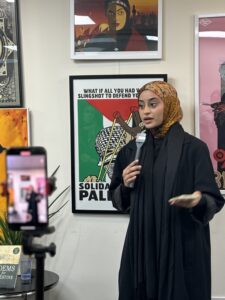
Mizan the Poet performed ‘The Time for Talking is Over’. Mizan noted it was inspired because after the events on October 7, he watched an interview with Owen Jones and Dame Margaret Hodge; “this is my opinion, she is a horrible person, completely anti-Corbyn. In the middle of the interview, she said she visited Israel, she was in the kibbutz, and said if only the people in the settlements and people in Gaza would talk… there needs to be more than talking. If she cannot see people in Gaza live in a blockade, and all she thinks the solution to the problem is talking, there is a big problem. I wrote this in response to that.“
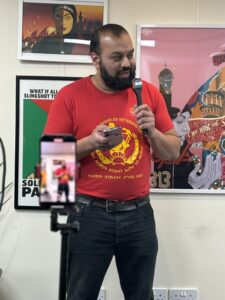
Mizan’s second poem is about the phrase ‘from the river to the sea’, what it means to him, how the Conservative government attempted to weaponise it and how Suella Braverman sought to ban the phrase.
Following Mizan was Taslima Khan. Taslima said she started to write poems to release thoughts about the genocide; her poetry was poignant and sorrowful. She ended her performance by urging people to educate others and talk about the issue, as a simple conversation can raise great awareness.
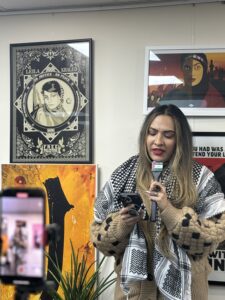
The final headliner was Huseyin Abudharr Ali-Diakides. Huseyin’s first one is called ‘Mothers of the Oppressed’. His second poem, ‘Obsessed’, was written following a Facebook debate wherein he was accused of harbouring anti-Semitic sentiments and incessantly labelled as ‘obsessed’ with the Palestine struggle, thus he transformed his retort into a poetic composition. Huseyin’s final poem written during his time at university; he was a member of the Global South Solidarity Society and organised events and stalls focused on Palestine. On one such occasion, the Student Union shut down their stall and the Israeli Advocacy Project also attempted to get Huseyin dismissed from university. He called the poem, ‘Children of Adam’.
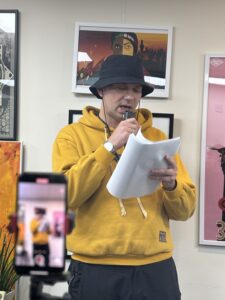
The floor was subsequently made available to open mic participants, featuring Qur’anic recitations of verses from Surah Al-Kahf.
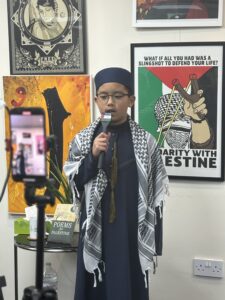
Read the bios of the headliners and open mic participants below:
Anika Wadood is a Politics and History student, writer, and poet, studying at SOAS. She organises and hosts poetry evenings and has performed at various events in London. Anika’s writing and poetry explores themes of social injustice, cultural and religious identity through her own experiences and amplifies silenced voices from marginalised communities. In her spare time, she posts book reviews and involves herself within the South Asian creative community, taking part in exhibitions, photoshoots, and major events.
Hussein Sheekh is a young writer from East London whose work explores themes of colonialism, social justice, family dynamics, love, and mental health. Influenced by his experiences living in Egypt and the vibrant energy of London, Hussein’s poetry is direct, honest, and unafraid to tackle tough subjects. He is passionate about using poetry as a tool for understanding the human experience and sparking conversation, whilst shedding light on the forgotten stories that live amongst us.
Taslima Khan goes by the definition of Artivist, using art as her tool of activism. Multidisciplinary artist, working in front and behind the camera, as an actor, spoken word artist, dancer, and presenter. Behind as a director, creative producer, production designer, stylist, designer within the film, music, entertainment industry.
Zaynab Mufti is a student and poet who is currently pursuing a MA in Political Thought. She takes the stage and voices issues pertaining to faith and social justice through her poetry where she has performed around London and the UK. She has also been featured on Islam Channel and has recently had her poetry published in a non-fiction book.
Huseyin Abudharr Ali-Diakides is the campaigns manager at the Islamic Human Rights Commission and is a published poet, with his book “Love, Hate and A Bench” released in 2019. He writes about subjects such as Islam, politics, life, and love.
Mizan Rahman ‘Mizan the Poet’ is a campaigner and spoken word activist.
Thalia S. A. is a young author and illustrator born in Manchester, England, and now lives in Warwickshire. She won a few writing categories in the Young Muslim Writers Awards 2022 and 2023. Last year she was shortlisted for the Muslim News Awards for Excellence under Imams Hasan and Husayn Children’s Awards category. Seizing the opportunity of being home-educated during the pandemic, she authored her first chapter book, “Mermaid Lagoon,” at the age of 10. Thalia is also active in doing voice overs recording and completed a project for the Usborne Foundation in 2022.
Zayd I. A. is a creative young man born and raised in Warwick, UK. Some of his writings were published in anthologies alongside thousands of children from all over the United Kingdom by Young Writers. Zayd loves Quran recitations by Sheikh Mishary Alafasy. Taking advantage of being home-educated during the pandemic until 2022, he completed memorising his Juz Amma at 10 years old. Now Zayd is back to school in Year 6 and continuing his Hifdh al Quran. He also actively recites the Quran for charity events. Zayd also actively does voice over for many projects. Last year he did a voice over recording for an audio drama book called William. It was directed by the screenwriter and filmmaker Hank Isaac from USA.
Arif Husni is a Manager and Senior Engineer at National Grid, but he is also fond of writing poems and haikus since the people around him are mostly writers – including his own mother and late father in law. Today he just wants to share his poem, and at the same time encouraging his children to contribute in their own fields for a good cause.
Ann J. is a stay-at-home mum and the owner of Bismillah Book Box, which also runs a Muslim Bookworms page on Facebook that focuses on books suitable for Muslim readers. At the same time, it creates awareness among parents about books that warrant further discussion or may not be suitable for Muslim children. She had her short stories and poems published in anthologies when she was young back in Malaysia. Since then, today is her first time back on poetry. She is also the illustrator for the Mermaid Lagoon cover page written by her daughter.




